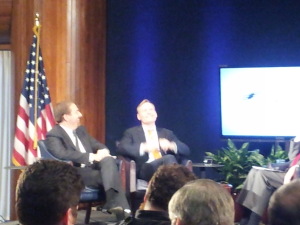Last night, I happily attended the latest Kalb Report at the National Press Club. The topic was the Sunday morning public affairs shows and the guests were Chuck Todd of Meet the Press and John Dickerson of Face the Nation (and in case you didn’t know, moderator Marvin Kalb was moderator of Meet the Press in the 80s). As is usually the case, the program was very interesting, especially to someone like me, who always watches Meet the Press or Face the Nation on Sunday and has been doing so for decades.

Not paying attention
But apparently, not everybody else was as interested or at least, not everybody was giving the program their full attention. Next to me, two women were whispering to each other during most of the program. On my other side, a woman was busy on her iPhone. I wasn’t sure what she was doing–maybe texting or maybe taking notes–but she was at it the whole time. Behind me, a gentleman kept fiddling with his camera. In front of me, two women were whispering to each other every few minutes. An official-seeming photographer (although I am not sure he was there officially) kept photographing the stage (and annoyingly, had his camera set to make clicking noises as though it were an old-fashioned camera).
Distracting others
Even though I was very interested in the program, I was getting distracted by what was going on around me. Other people’s lack of attention (or perhaps, it was lack of manners) was attracting my attention!
Lack of manners or short attention span?
I have been seeing this lack of attention a lot and in many different types of venues. Just last week, I took an email marketing class along with about 15 other people. Two women were busy whispering for a good portion of the class, while the instructor was explaining something. These women showed a complete disregard for the instructor, and also for the rest of the class. Were they just completely unaware of how distracting they were being? Were they bored? Was something else more important happening that had to be discussed right there and then? I don’t know, but again, their rudeness (because talking while someone else is presenting is just plain rude) was distracting me.
More and more, short attention spans are making it hard for anybody or anything to retain attention for any length of time. If people watch live television, they start fiddling with their tablet or phone during the commercials. If people are at the movies, they fiddle with their phone during the trailers (and sometimes, during the movie too).
A real challenge for marketers
People seem more restless and less able to focus and that’s a real challenge for communicators and marketers. We’ve seen an increase in image-based marketing precisely because people are not reading text. Marketing materials must grab attention quickly and only hope to hold on to it for seconds.
The impact
1. Shorter messages. Marketers have to keep in mind that their messages are competing with thousands of other messages and with a shortened attention span. This means we really have to know what we are selling (or advocating), and how to distill it into as few words as possible.
2. Customization. We also need to realize that people are living in little bubbles, where they choose to pay attention to only what they want to pay attention to. Mass messaging doesn’t work anymore. People are demanding to get only what they want to get.
3. Becoming part of the discussion. Messages alone don’t do it. Now, you have to become part of the conversation. Take the REI announcement a couple weeks ago that it was closing on Black Friday “to let associates be outside.” Everyone got in on this conversation. REI used the hashtag #OptOutside in the announcement. Discussions on social media and mass media ensued. Brilliant!
Have you noticed the drop in attention? What are you doing to counter it? Can you? Please let me know in the comments.
About Deborah Brody
Deborah Brody writes and edits anything related to marketing communications. Most blog posts are written under the influence of caffeine.



Deborah,
You are so right!! I initially attributed my annoyance at these distractions as me being too sensitive. But, I am so glad to see that I am not the only one.
I think a lot of the “lack of attention” also has to do with information overload. There is soo much to sift through these days everyone is much more discerning about what they will spend time on digesting.
As we were crafting our year -end appeal this year I knew that sharing information on our issue was not enough, we had to make our supporters understand the urgency of our work. Creating a compelling message, through urgency, emotion, impact etc. is more essential than ever.
As for opportunities to present in groups. I ask, just like being at the movies, for everyone to mute their phones. This sets a tone that these types of distractions will be frowned upon. As a presenter I also try to create a more conversational/interactive presentation with the hopes of engaging the audience instead of just talking at them. The days of the didactic lecture are gone. People must be stimulated, either visually, emotionally or topically.